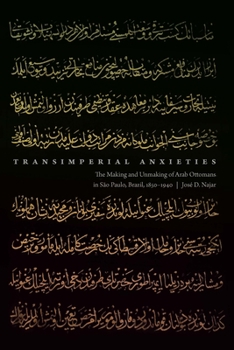Transimperial Anxieties: The Making and Unmaking of Arab Ottomans in São Paulo, Brazil, 1850-1940
From the late 1850s to the 1940s, multiple colonial projects, often in tension with each other, influenced the formation of local, transimperial, and transnational political identities of Arab Ottoman subjects in the eastern Mediterranean and the Western Hemisphere. Arab Ottoman men, women, and their descendants were generally accepted as whites in a racially stratified Brazilian society. Local anxieties about color and race among white Brazilians and European immigrants, however, soon challenged the white racial status the Brazilian state afforded to Arab Ottoman immigrants. In Transimperial Anxieties Jos D. Najar analyzes how overlapping transimperial processes of migration and return, community conflicts, and social adaption shaped the gendered, racial, and ethnic identity politics surrounding Arab Ottoman subjects and their descendants in Brazil. Upon arrival to the Brazilian Empire, Arab Ottoman subjects were referred to as turcos, an all-encompassing ethnic identity encased in Islamophobia and antisemitism, which forced the immigrants to renegotiate their identities in order to secure the possibility of upward mobility and national belonging. By exploring the relationship between race and gender in negotiating international and interimperial politics and law, national identity, and religion, Transimperial Anxieties advances understanding of the local and global forces shaping the lives of Arab Ottoman immigrants and their descendants in Brazil, and their reciprocity to state structure.
Format:Hardcover
Language:English
ISBN:1496214684
ISBN13:9781496214683
Release Date:June 2023
Publisher:University of Nebraska Press
Length:356 Pages
Weight:1.52 lbs.
Dimensions:0.9" x 6.0" x 9.0"
Related Subjects
HistoryCustomer Reviews
0 rating





